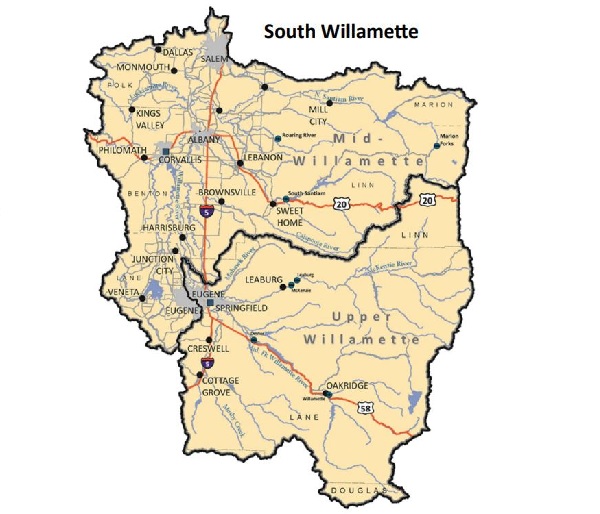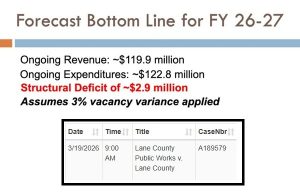Applications for Salmon and Trout Advisory Committee due Aug. 4
5 min read
|
Getting your Trinity Audio player ready...
|
from the Oregon Department of Fish and Wildlife
The Oregon Department of Fish and Wildlife is seeking a new member to represent the South Willamette district on the Salmon and Trout Advisory Committee. Interested individuals are encouraged to apply by 5 p.m. on Aug. 4.
Desired applicants should have experience working with volunteers, community service organizations, or involvement in natural resources or angling education. Ideally, candidates should have knowledge of the issues and activities performed by Salmon and Trout Enhancement Program biologists, volunteers, and partner organizations within their territory.
Candidates that can connect with or represent young adults, women, families, or underrepresented populations are strongly encouraged to apply.
For application materials, visit the ODFW STEP webpage and use the “Click here to apply” link.
Candidates for this position must be a resident of the Mid-Willamette or Upper Willamette STEP district, which encompasses a territory that includes the Willamette Valley extending from north of Salem to south of Eugene, and from the Coast Range to the Cascades.
This district includes but is not limited to the communities of Oakridge, Cottage Grove, Veneta, Springfield, Eugene, Junction City, Sweet Home, Corvallis, Philomath, Albany, Lebanon, Monmouth, Salem, Stayton and Mill City.
STEP was created by the Oregon Legislature in 1981 to provide a way for volunteers to participate in the restoration of native stocks of salmon, steelhead, and trout. Since that time, thousands of volunteers have assisted Oregon’s fisheries through their involvement in STEP, donating money, materials, equipment, and countless hours of volunteer time and labor.
The nine members of the Salmon & Trout Advisory Committee are appointed by the governor and represent all regions of Oregon. The committee meets two times per year in various communities throughout the state to conduct STEP business and advise ODFW and the Fish and Wildlife Commission on issues regarding STEP. Committee members are volunteers; however, business-related expenses may be reimbursed.
Member duties and responsibilities (as retrieved July 21, 2025) include the following:
Attend STAC meetings
STAC generally meets at least two times per calendar year at various locations around the State. Meetings are normally held on Thursdays and are followed by a field trip for half of Friday. Members usually travel on Wednesday and Friday afternoon, depending on distance from the member’s home. Some remote locations may require extra travel time. Committee members are expected to attend all meetings and participate in the field
trips. If a Committee member is unable to attend a meeting, notification to the STEP staff as early as possible is required.
Meeting schedules and locations for the following year are chosen at the fall meeting. STAC members will be reimbursed for travel expenses by submitting a properly executed Travel Expense Detail Sheet, which is included with the briefing material package. Expenses for family members will not be reimbursed.
In addition to regular meetings, STAC members may be occasionally asked to participate in email review of documents, virtual meetings, and/or conference telephone calls in order to facilitate STAC business.
Prepare and review meeting materials and other information provided by ODFW
Oregon Revised Statute 496.460 states “STAC shall review the policies of ODFW and make recommendations to ODFW and the Commission concerning the implementation of salmon and trout enhancement projects.”
Each committee member should prepare and submit a brief report about STEP activities, and any issues and concerns they are aware of for their area at least three weeks prior to each STAC meeting. Area report information may include information provided by the area STEP biologists and information prepared by the STAC member. Additional updates will be reported by each member at the STAC meeting.
Each committee member will receive a meeting package including the agenda, agenda topic briefing materials, mini-grant applications, fish propagation permit applications, and other items several days prior to each meeting. The member should become familiar with the meeting materials and be prepared to discuss and make informed recommendations or decisions on action items.
Coordinate with local STEP/volunteer groups, participate in STEP projects, attend periodic meetings of local groups, promote STEP in Area of Responsibility
One of the primary roles of STAC member is to act as a liaison between ODFW and the volunteers on the ground and, as stated previously, to make recommendations to ODFW concerning the implementation of STEP. To do this, each committee member should, to the extent practical, become familiar with each STEP group in their AOR by
introducing themselves to the group leadership, attending meetings and participating in STEP group activities.
Each committee member should visit STEP facilities in their AOR to familiarize themselves with location, purpose, infrastructure and basic operation of the facility.
STAC members will review, to the extent possible, the mini-grant applications from their area prior to submission to the STEP staff. STAC members should be prepared to discuss mini-grant applications from their area as they are presented for review at STAC meetings. STAC members are encouraged to provide an overview of STAC actions to their area STEP groups. STAC members may be contacted by the ODFW staff for their input on local area issues and concerns.
Serve as a committee officer (chair, vice chair, secretary)
The vice chair, secretary and alternate secretary for the next calendar year are elected at the fall meeting. The seated vice chair becomes chair for the next calendar year. The chair is responsible for conducting STAC meetings, reviewing agenda topics with the STEP coordinator and presenting the annual STEP report to the Fish and Wildlife Commission.
Coordinate with STEP biologist and district biologist
Each STAC member is encouraged to establish a strong working relationship with their area STEP biologist and district fisheries biologist. Regular contact with the district is expected and should include some form of regularly scheduled meetings.
STAC members should coordinate the development of STAC meeting area reports with the STEP biologist and should discuss mini-grant applications with district staff prior to submission to the STEP staff. STAC members should discuss area issues and projects with the STEP and district fisheries biologists to help maintain an informed liaison between the STEP groups and the Department of Fish and Wildlife.
Other duties as assigned
Perform duties requested by ODFW/STAC including representing STAC on other advisory committees or working groups, helping with STEP conference planning, and STAC assignments.






